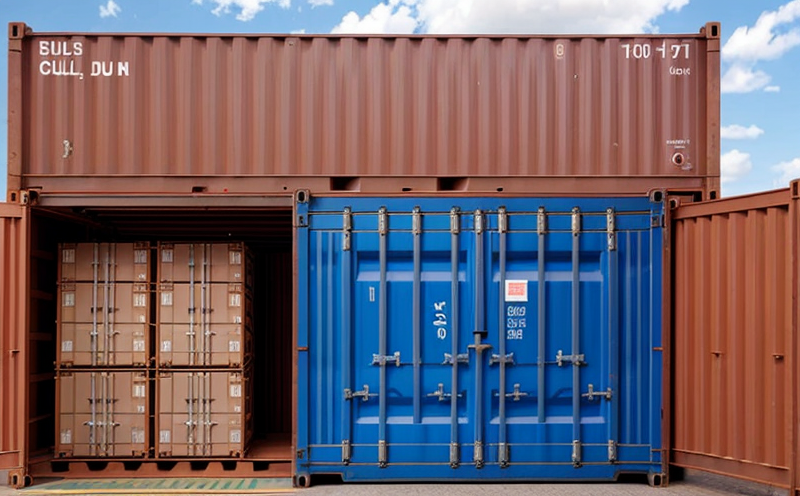USP Plastic Container Extractables Testing
The USP (United States Pharmacopeia) Plastic Container Extractables Testing is a critical component in ensuring the safety and efficacy of pharmaceutical products. This testing procedure aims to identify potential chemical compounds that may leach from plastic containers into contact with drug substances or excipients, which could affect product quality, stability, and ultimately patient safety.
The primary objective of this test is to assess whether the container closure system (CCS) used in packaging pharmaceutical products meets stringent USP standards. Compliance with these standards not only ensures regulatory compliance but also builds consumer trust by confirming that the packaging does not introduce unwanted or harmful substances into the product during storage and distribution.
The testing process involves several key steps, including sample preparation, dissolution, analysis, and evaluation against predefined USP guidelines. Specimens are typically prepared by simulating real-world conditions under which they would be exposed to various solvents and temperatures. Analytical techniques such as high-performance liquid chromatography (HPLC), inductively coupled plasma mass spectrometry (ICP-MS), or gas chromatography-mass spectrometry (GC-MS) are used to detect and quantify the extractables.
Once the analysis is complete, a detailed report is generated outlining all detected compounds along with their concentrations. This report serves multiple purposes, including providing valuable insights for R&D teams in optimizing container design, ensuring compliance with regulatory requirements, and supporting quality control initiatives aimed at maintaining product integrity throughout its lifecycle.
- Industry Applications: Pharmaceutical manufacturing, packaging development, quality assurance/quality control (QA/QC), supply chain management.
- Customer Impact and Satisfaction: Enhanced patient safety, improved product reliability, increased customer confidence in brand integrity.
The importance of this testing cannot be overstated. In today’s highly regulated pharmaceutical industry, any deviation from established standards can lead to significant operational disruptions and reputational damage. By adhering strictly to USP guidelines, companies demonstrate their commitment to maintaining the highest levels of product safety and quality.
Why It Matters
The significance of USP Plastic Container Extractables Testing extends beyond mere compliance; it plays a pivotal role in safeguarding public health. The pharmaceutical sector relies heavily on packaging to protect sensitive drugs from environmental factors like light, moisture, and temperature fluctuations. However, certain materials used in these containers can interact with the drug product, potentially leading to contamination or degradation.
Extractables testing helps identify such interactions early in the development process, allowing manufacturers to make necessary adjustments before proceeding further down the supply chain. This proactive approach ensures that only safe and effective products reach patients, thereby reducing the risk of adverse events associated with contaminated medications.
In addition to protecting consumers, robust extractables testing also benefits manufacturers by minimizing recalls and withdrawals due to quality issues. Such incidents are not only costly but can severely impact brand reputation. By investing in thorough testing upfront, companies can avoid these pitfalls, ensuring long-term success in the competitive pharmaceutical market.
- Industry Applications: Identifying potential leachables from various plastic materials used in drug packaging.
- Customer Impact and Satisfaction: Ensuring patient safety through reliable and consistent product performance.
In conclusion, USP Plastic Container Extractables Testing is an indispensable tool for maintaining the integrity of pharmaceutical products. Its implementation underscores a commitment to quality and safety, which are paramount in this highly regulated industry.
Industry Applications
- Packaging Development: Assisting R&D teams in selecting appropriate materials for container closure systems that do not interact with the drug product.
- Quality Assurance/Quality Control (QA/QC): Ensuring that all packaging components meet stringent USP standards before release to market.
- Supply Chain Management: Monitoring and verifying compliance throughout the supply chain, from raw material sourcing to final product delivery.
The application of this testing extends across various stages of pharmaceutical production. From initial formulation development through manufacturing and distribution, USP Plastic Container Extractables Testing provides critical data that informs decision-making processes at every level. By leveraging these insights, companies can optimize their supply chains, enhance operational efficiency, and ultimately deliver superior products to patients.
Customer Impact and Satisfaction
- Patient Safety: By ensuring that no harmful chemicals leach into the drug product, this testing contributes significantly to patient safety.
- Product Reliability: Consistent performance of packaging materials helps maintain consistent product quality and effectiveness over time.
- Brand Integrity: Demonstrating adherence to stringent regulatory standards instills confidence in consumers about the reliability and safety of products.
Achieving high levels of customer satisfaction is crucial for any business, especially within the pharmaceutical sector. Through meticulous extractables testing, companies can ensure that their products meet or exceed expectations, fostering trust between manufacturers and end-users. This trust translates into loyalty, which is vital given the competitive nature of the industry.





